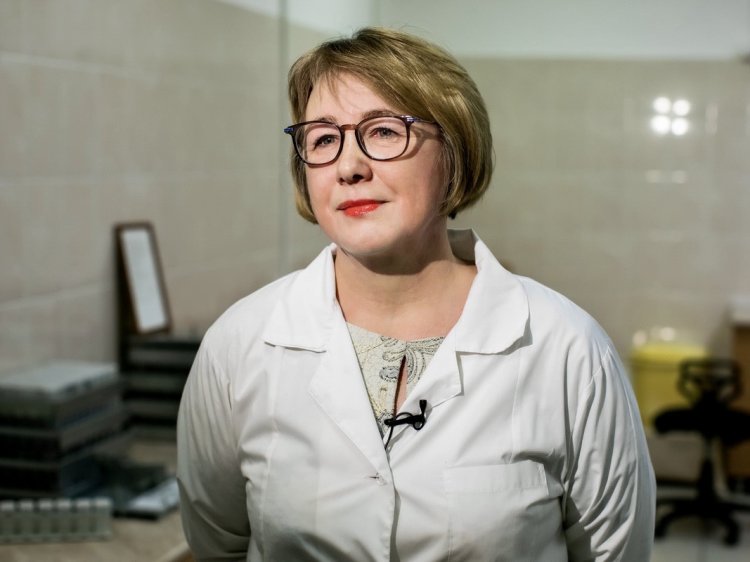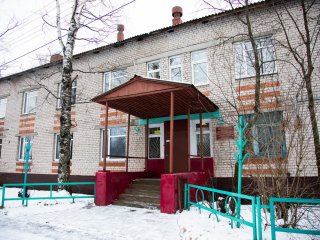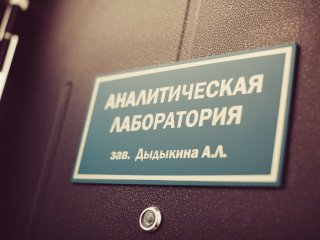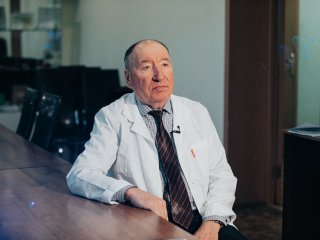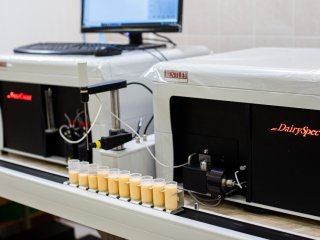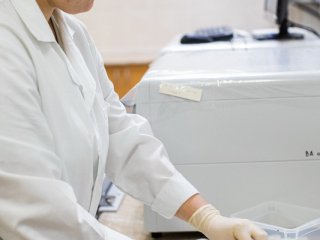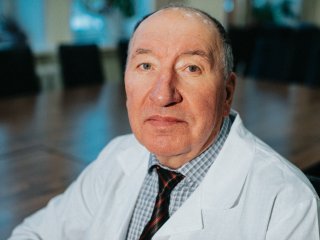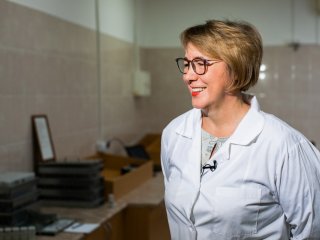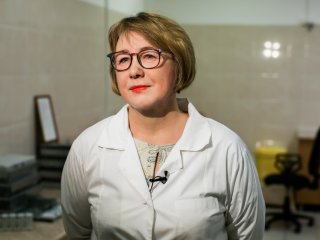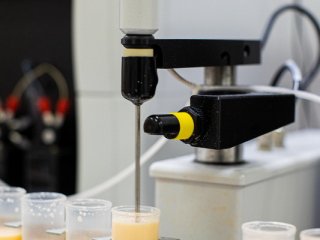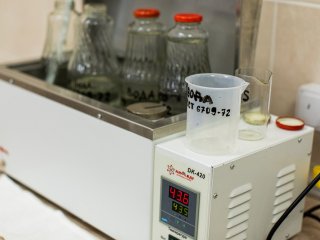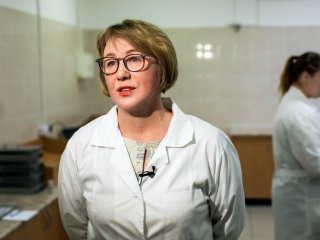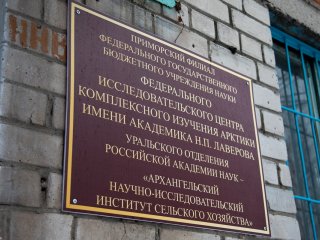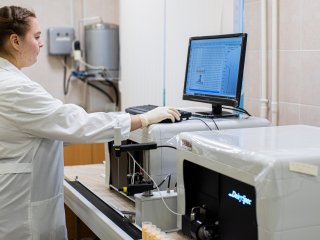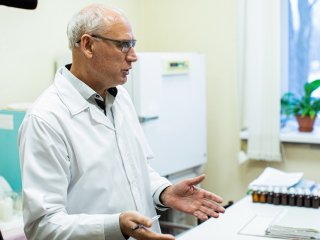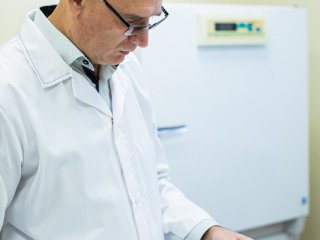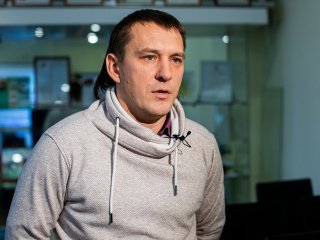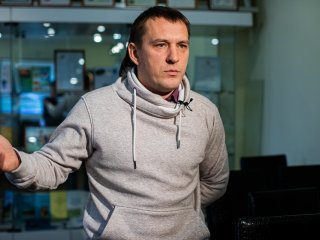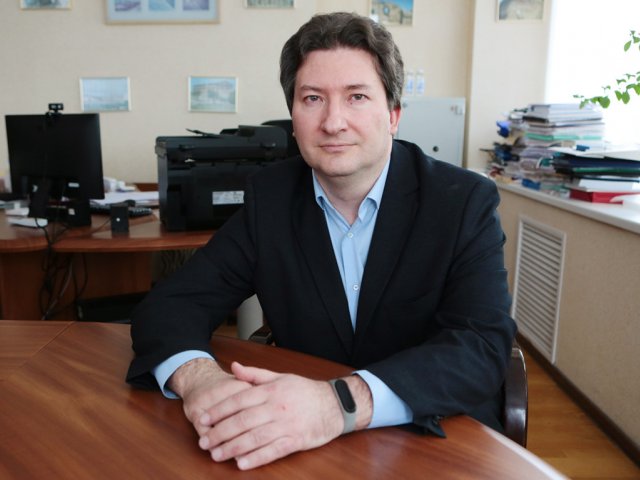Aleksandra Dadykina. Photo: Elena Librick / Scientific Russia
Harsh climatic conditions, a short growing season, waterlogged soils – all this makes the development of agriculture in the Far North of Russia a very difficult process. Nevertheless, for more than 30 years, the Agricultural Research Institute has been operating in the Arkhangelsk Oblast, the only institution of agricultural science in the region, where great success has been achieved in the field of agriculture and animal husbandry.
In the Arkhangelsk Oblast, the famous Kholmogorsky cattle, Mezen horses, and reindeer are being preserved and improved, the disturbed lands of the Arctic tundra are being restored, and new varieties of crops are being created. Arkhangelsk seed potatoes are known and appreciated throughout Russia.
Scientific Russia visited the Arkhangelsk Agricultural Research Institute of the N. Laverov Federal Center for Integrated Arctic Research of the Ural Branch of the Russian Academy of Sciences. The scientists talked about their most important projects.
Kholmogorsky cattle – the calling card of the Arkhangelsk Oblast
The Kholmogorsky cattle was first bred by local cattle breeders back in the 17th century in the Dvinsky Uezd (now – Arkhangelsk Oblast) in the north of the Russia. Today, scientists of the Arkhangelsk Agricultural Research Institute continue to preserve the unique gene pool of Kholmogorka.
“This is a unique dairy breed of cattle, adapted to life in the North. Today, cows of the Kholmogorsky breed are kept in 11 subjects of the Russian Federation, they occupy 3rd place in terms of milk yield out of 26 dairy breeds in Russia. Our Kholmogorsky cows are adapted to harsh climatic conditions and are less prone to diseases. This is a very unpretentious animal, which over the past 200 years has repeatedly rescued our country in times of famine,” says Valentin Gintov, Director of the Arkhangelsk Agricultural Research Institute.
In recent years, Arkhangelsk breeders under the leadership of Doctor of Agricultural Sciences Valentin Prozherin have done a lot of work to create a new intra-breed type “Northern” by using the gene pool of Holstein cattle.
The Arkhangelsk Agricultural Research Institute is also engaged in the examination of the quality of milk, and the determination of the breeding value of animals. In the dairy laboratory, specialists of the institute can determine the health of controlled animals by the qualitative characteristics of milk, give recommendations to specialists of farms on feeding and prevention of animal diseases.
“Our laboratory is equipped with the Bentley DairySpec Combi 150 analytical system. It analyzes milk by eight indicators: mass fraction of protein, fat, lactose, dry matter content, skimmed milk residue, urea, somatic cells, and freezing point. Only 40 milliliters of milk from each cow are enough for analysis. But this is only one part of the big technology. The second part of it is androids, milk test containers, chips, portable devices, and, of course, universal milk counters. Thus, data from each animal is recorded using a modern information and analytical system. The received data is automatically generated into the regional information base. The laboratory covers almost all agricultural enterprises of the Arkhangelsk Oblast that are engaged in livestock breeding,” says Alexandra Dydykina, Head of the Laboratory of Milk Quality Control of the Arkhangelsk Agricultural Research Institute.
Over the past five years of work with the farms of the Arkhangelsk Oblast, more than 20 contracts have been concluded. More than 100 thousand head of cattle have been tested.
Alexandra Dydykina, Head of the Laboratory of Milk Quality Control of the Arkhangelsk Agricultural Research Institute.
A bit of history
Agricultural science in the Far North of Russia has more than a century of history, it developed along with the development of the territories of the North. The possibility of agriculture in the Far North of Russia at the beginning of the 20th century was scientifically proved by A. V. Zhuravsky. In 1911, the first scientific institution in the history of the Russian state in polar conditions, the Pechora Agricultural Experimental Station of the Russian Academy of Sciences, was opened in the Pechorsky Uezd of the Arkhangelsk Governorate (now the Komi Republic).
In 1991, the Arkhangelsk Agricultural Research Institute was established based on experimental stations and tasked with conducting scientific research, as well as scientific support and development of the agro-industrial complex in the vast Arctic territory of the Arkhangelsk Oblast and the Nenets Autonomous Okrug.
Horses and Reindeer
Reindeer herding and horse breeding are traditional areas of research at the Arkhangelsk Agricultural Research Institute. With the help of science, the only gene pool farm in Russia and the world for the preservation of the Mezen horse breed (based on the Rybkolkhoz Sever) and several commodity farms in the Mezensky District have been created here; a system for improving the breed’s gene pool has been developed and is being implemented. Scientists of the institute annually research the gene pool using DNA technologies, tests of Mezen horses according to the developed original system that allows them to identify their universal working capacity.
A highly productive breeding herd of reindeer has been created in the Naryan-Mar Agricultural Experimental Station (FCIARctic branch in Naryan-Mar) by crossing animals of the Kolguevskaya and Malozemelskaya populations. A system of genetic monitoring of reindeer using DNA technologies in the conditions of the Nenets Autonomous Okrug has been developed and is being implemented.
Second Bread
Potato growing is another calling card of Arkhangelsk farmers. Annually, more than half a million greenhouse mini-tubers and 60 thousand plants in field test nurseries are produced from 80 thousand pieces of test tube meristem potatoes. More than 3,000 tons of seeds of higher reproductions are produced in the Arkhangelsk Oblast.
“Scientists have proved that the closer to the North, the less pronounced the so-called infectious background. We are now actively studying these processes and are convinced that our region has extremely favorable conditions for the production of potato seeds. For example, there is no aphid on the Arkhangelsk land – one of the main carriers of viruses – there are practically no aphids here. We have been monitoring for almost 10 years, and during this time we have seen only isolated cases of potential virus carriers,” said Alexey Shamanin, a researcher at the Plant Breeding Laboratory of the Arkhangelsk Agricultural Research Institute.
Alexey Shamanin, a researcher at the Plant Breeding Laboratory of the Arkhangelsk Agricultural Research Institute.
Perennial grasses and cereals
New productive plant varieties are being grown in the fields of the Kotlas Experimental Station of the Arkhangelsk Agricultural Research Institute. All these varieties are created based on local material and successfully work in the production of the northern region.
“In the State Register of Selective Breeding Achievements, 12 varieties of perennial herbs of Arkhangelsk selection have been registered, which have a high productivity of feed mass and, subject to production technology, can fully meet the needs of animal husbandry in feed in the conditions of the northern region. A special place among the varieties of perennial grasses is occupied by meadow clover as a high-protein crop and the main component of most grass mixtures. The last varieties created at the Institute are Prior and Tayozhnik. They are extremely in demand in agricultural production as highly productive and resistant to major pathogens, in particular to sclerotiniosis,” said Valentina Korelina, Head of the Plant Growing Laboratory of the Arkhangelsk Agricultural Research Institute of Agricultural Sciences, Candidate of Agricultural Sciences.
Scientists of the Arkhangelsk Agricultural Research Institute note that the main problem with the introduction of new promising varieties into production is the extremely undeveloped seed production of crops. There are new varieties in demand, but it is very difficult to propagate them and bring them to the consumer. The main reason for the decrease in the efficiency of seed production, according to scientists, is the elimination of the systemic structure in the region, that is, the elimination of specialized seed farms.
“We believe that the primary task in the northern region is the restoration of a scientifically sound system of agricultural seed production, which will take at least six years. Having analyzed the situation with seed production, we consider the territory of the Arkhangelsk Oblast as a platform for organizing seed production of the entire North of Russia,” says Valentina Korelina.
Not so long ago, the youth Laboratory of Innovative Technologies in the Agro-Industrial Complex, equipped with modern equipment, was opened in the Arkhangelsk Agricultural Research Institute within the framework of the Science target program. Based on the laboratory, scientists will develop new methods of breeding Kholmogorsky cows using DNA technologies. You can learn more about the directions of work of the Arkhangelsk Agricultural Research Institute and the development of agricultural science in the region by reading our interviews with its Director, former Minister of Agriculture of the Arkhangelsk Oblast Valentin Gintov, and Corresponding Member of the Russian Academy of Sciences, Advisor to the Director of the N. Laverov Federal Center for Integrated Arctic Research of the Ural Branch of the Russian Academy of Sciences Oleg Kononov.
Photo on the homepage: 123RF.
